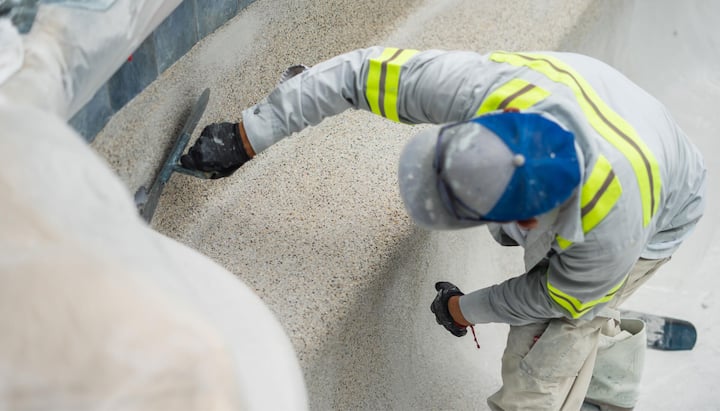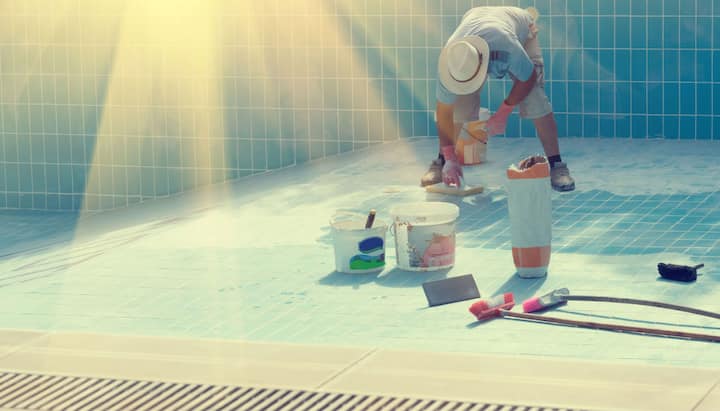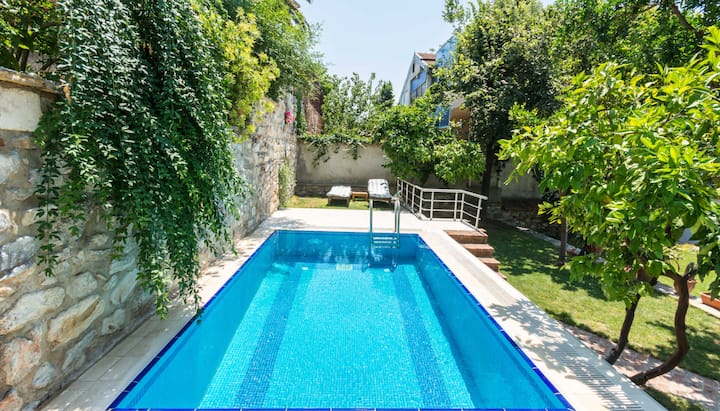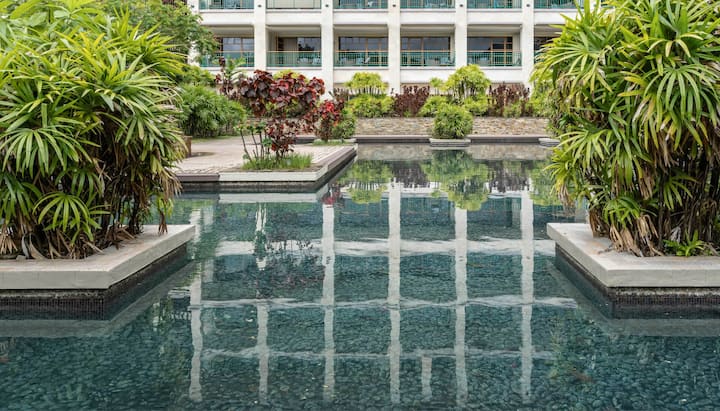The Pool Resurfacing Experts in Los Angeles
As the premier pool resurfacing company in Los Angeles, we possess unmatched expertise in restoring the beauty and functionality of your swimming pool. Our team utilizes state-of-the-art techniques and premium materials to deliver unparalleled results. Our comprehensive services include:
- Resurfacing: Restore the smooth, vibrant surface of your pool with our advanced resurfacing techniques.
- Leak Detection and Repair: Identify and resolve leaks efficiently, ensuring your pool remains watertight.
- Tile Repair and Replacement: Enhance the aesthetics and durability of your pool by addressing any damaged or missing tiles.
- Deck Repair: Restore the integrity and safety of your pool deck, enhancing its appearance and longevity.
- Equipment Maintenance: Ensure optimal functionality of your pool equipment, including pumps, filters, and heaters.
We are committed to customer satisfaction, providing personalized consultations to understand your specific needs. Our team of highly skilled professionals ensures meticulous attention to detail, delivering the highest quality results every time. Contact us today for a free estimate and experience the unparalleled pool resurfacing expertise of the best in Los Angeles.

Kinds of pool surfaces
Kinds of Pool Surfaces Available for Los Angeles
Choosing the right surface for your pool is a crucial decision that can significantly impact its aesthetics and functionality. Here’s a comprehensive guide to the different types of pool surfaces available:
- Pebble Aggregate Surface: Pebble aggregate surfaces consist of small, smooth pebbles embedded in a durable resin base. They offer a natural and textured appearance, providing a slip-resistant and durable finish.
- Tile Surface: Tile surfaces offer a wide range of customization options, allowing you to create intricate designs and patterns. They are highly durable, easy to clean, and available in various colors and finishes.
- Concrete Surface: Concrete surfaces are a classic choice, offering a smooth and durable finish. They can be painted or coated with a variety of materials to enhance their appearance and texture.
- Fiberglass Surface: Fiberglass surfaces are prefabricated and provide a seamless, non-porous finish. They are quick and easy to install, offering exceptional durability and a smooth, low-maintenance surface.
- Quartz Surface: Quartz surfaces are composed of crushed quartz aggregates and are renowned for their exceptional durability and resistance to stains, chemicals, and fading. They offer a luxurious and high-end finish.
In addition to the type of surface, other factors to consider include the size, shape, and depth of your pool, as well as your personal preferences and budget. It’s recommended to consult with a reputable pool professional in Los Angeles to discuss the best options and ensure a successful pool resurfacing project.
How often should I get my Los Angeles pool resurfaced?
The frequency of pool resurfacing in Los Angeles depends on several factors, including:
- Pool Usage: Frequent use and heavy foot traffic increase wear and tear, requiring more frequent resurfacing.
- Water Chemistry: Proper water balance and maintenance help prevent damage to the pool surface.
- Sun Exposure: Ultraviolet rays can degrade pool surfaces, leading to early fade and wear.
- Surface Type: Different pool surfaces have varying lifespans, such as plaster lasting 5-8 years, while quartz may last 15 years or more.
Despite these variables, here’s a general guideline:
- Plaster or aggregate pools: Resurface every 5-8 years
- Quartz or fiberglass pools: Resurface every 10-15 years
However, it’s always recommended to consult with a professional pool resurfacing company for a specific assessment of your pool’s condition and to determine the appropriate resurfacing schedule. Neglecting to resurface your pool can lead to costly repairs or even structural damage, so timely resurfacing is crucial for maintaining your Los Angeles pool investment.

How Do I Know When My Los Angeles Pool Needs Resurfacing?
Maintaining the beauty and functionality of your pool requires proactive care, including resurfacing when necessary. Here are some telltale signs that your Los Angeles pool may be due for a makeover:
Cracking and Peeling
Cracks and peeling are apparent indicators of surface deterioration. These defects allow water to penetrate deeper into the pool structure, potentially leading to leaks, rust, and other costly repairs.
Rough or Abrasive Surface
A once-smooth pool surface gradually becomes rough and abrasive over time due to sun exposure, chemical exposure, and friction. This roughened texture can irritate swimmers’ skin and make the pool less enjoyable.
Fading and Discoloration
Sun exposure and chemical treatments can cause the pool’s finish to fade and discolor. While aesthetic concerns may not seem critical, discoloration often signifies the breakdown of the protective surface layer, making the pool more vulnerable to damage.
Efflorescence
Efflorescence, a whitish or powdery substance on the pool’s surface or walls, results from calcium deposits. It can block pores, impede water circulation, and create unsightly blemishes.
Leaking
Leaks are a severe problem that requires immediate attention. They can waste water, increase energy costs, and damage the surrounding area. Resurfacing can seal leaks and restore the pool’s integrity.
Rust Staining
Rust stains, typically brownish or reddish in color, occur when metal components within the pool structure are exposed to moisture and oxygen. These stains can be stubborn to remove and may necessitate resurfacing to permanently eliminate them.
Algae and Mold Growth
Algae and mold thrive in areas with moisture and sunlight. If these organisms are persistently present on your pool’s surface or walls, it suggests that the protective layer is compromised and resurfacing is warranted.
Water Chemistry Imbalances
Resurfacing can be necessary even if the pool’s surface appears pristine. If your pool water is consistently difficult to balance, it may indicate a problem with the surface finish that allows chemicals to escape or react improperly.
Poor Adhesion
Poor adhesion, where the pool surface separates from the substrate, is a serious issue. It can create tripping hazards, water leaks, and structural damage. Resurfacing can address adhesion problems and restore the pool’s stability.
Age of the Pool
As a general rule, concrete pools have a lifespan of 10-15 years, while fiberglass pools can last 20-25 years. If your pool is approaching or has exceeded this age range, it’s wise to consider resurfacing to prevent costly future repairs.
Personal Preference
Ultimately, the decision to resurface your pool is subjective. If you desire a refreshed look, enhanced functionality, or improved water quality, resurfacing can transform your pool into a revitalized oasis.
Types of pool resurfacing materials

Plaster
Being a mixture of limestone, water, white cement, and marble sand, pool plaster is mostly white. However, it can also be dyed to other colors, depending on the color scheme of your pool. If you’re looking for an affordable pool remodeling material, it has to be plaster. Plus, it’s simple, elegant, and contemporary. The downside of using pool plaster is its roughness. Besides being harsh to touch, it also attracts algae, so you’ll have to maintain it every week. Moreover, an acid wash every three to five years can increase your pool’s lifespan.

Aggregate
Aggregate may be of any material, such as cement, glass beads, quartz, and pebbles. After applying it to your pool, the top layer is wiped off, exposing the pebbles underneath. You can choose between two kinds of aggregates: polished or exposed. Exposed aggregate has a bumpy texture since the pebbles are entirely uncovered. Meanwhile, polished aggregate has a flat surface with a smooth texture.

Tile
Tiles can be made of glass, stone, or porcelain. If you prefer, you can also mix up different kinds of tiles for your pool. Although they’re more expensive than other options, tiles give an upscale feel to your pool, making the surface smooth and shiny. Most importantly, it’s much easier to clean pool tile surfaces rather than aggregate.

How long does pool resurfacing take?
Revitalize your pool with our professional resurfacing services. Experience the splendor of a renewed backyard oasis that will enhance your summer enjoyment.
Our skilled team uses premium materials and advanced techniques to restore your pool to its former glory. We understand the importance of maintaining a beautiful and functional swimming environment.
Why Choose Our Pool Resurfacing Services?
- Enhanced Aesthetics: Give your pool a fresh, modern look that will turn heads.
- Improved Durability: Our resurfacing solutions provide superior resistance to wear and tear, extending the lifespan of your pool.
- Increased Energy Efficiency: Resurfacing can improve insulation, helping you save on energy costs.
- Customizable Options: Choose from a wide range of colors, textures, and finishes to match your personal style.
How Long Does Pool Resurfacing Take?
The duration of a pool resurfacing project varies depending on the size of the pool, the complexity of the design, and the weather conditions.
- Small Pools: Typically completed in 3-5 days.
- Medium-Sized Pools: Can take 5-7 days.
- Large Pools: May require up to 10 days or more.
Our team will provide a detailed timeline to ensure minimal disruption to your swimming season. Contact us today for a free consultation and quote.
Contact Us TodayWhy Choose Our Partners for Pool Resurfacing in Los Angeles?
- Unmatched Expertise: Our pool resurfacing partners in Los Angeles have years of experience and are dedicated to delivering exceptional results.
- Premium Materials: We use only the highest-quality materials for our pool resurfacing projects, ensuring durability and longevity.
- Personalized Approach: Every pool is unique, which is why our partners take a customized approach to resurfacing, meeting your specific needs and preferences.
- Innovative Techniques: Our partners stay up-to-date with the latest pool resurfacing techniques, providing you with the most advanced and efficient solutions.
- Exceptional Customer Service: From initial consultation to project completion, our partners prioritize open communication and responsive support.
- Industry-Leading Warranty: Our partners stand behind their work with industry-leading warranties, giving you peace of mind and lasting satisfaction.
- Eco-Friendly Practices: We believe in environmentally responsible practices, and our partners use eco-friendly materials and techniques to minimize our impact on the environment.
- Local Presence: Our partners are local experts who understand the specific needs of your community, ensuring tailored solutions for Los Angeles residents.
- Transparent Pricing: We believe in transparent pricing, so you can make informed decisions without any hidden costs or surprises.
- Proven Track Record: Our partners have a proven track record of success, with numerous satisfied customers who attest to the exceptional quality of their work.
Request a Quote
Did we miss anything?
Is your once-radiant pool now dull and outdated? Don’t despair! Pool resurfacing can restore its beauty and functionality, making it the centerpiece of your backyard oasis once again. We offer a comprehensive guide to pool resurfacing in Los Angeles, empowering you with the knowledge you need to make informed decisions and achieve a stunning pool.
Benefits of Pool Resurfacing:
- Enhanced Aesthetics: Revitalize your pool’s appearance with a fresh new surface that complements your backyard design.
- Improved Durability: Resurfacing strengthens your pool’s structure, increasing resistance to cracking and wear.
- Increased Energy Efficiency: Certain resurfacing materials, such as pebblesheen, reduce heat loss and lower energy consumption.
- Improved Water Quality: Resurfacing can eliminate cracks and imperfections that harbor bacteria, ensuring cleaner, healthier water.
Types of Pool Resurfacing Materials:
- Plaster: A traditional choice that provides a smooth, classic finish. However, it requires frequent maintenance.
- Pebblesheen: A blend of plaster and pebbles that offers increased durability and a shimmering, natural look.
- Agate: A luxurious material made from recycled glass that creates a stunning, iridescent finish.
- Quartz: A durable and versatile material that resists fading and stains.
Steps in the Pool Resurfacing Process:
- Drain and Clean: The pool is emptied and thoroughly cleaned to remove debris and prepare the surface for resurfacing.
- Repair and Rebar: Any cracks or structural issues are repaired, and new rebar may be installed to strengthen the pool shell.
- Apply the Resurfacing Material: The chosen material is applied to the pool surface in a multi-step process.
- Cure and Finish: The resurfacing material is allowed to cure and set, and the pool is filled and balanced.
Did We Miss Anything?
If you have any unanswered questions or require further clarification on pool resurfacing in Los Angeles, please do not hesitate to contact us. Our team of experts is dedicated to providing you with comprehensive assistance throughout your pool resurfacing journey.

Professional General Services in Public_Html
Welcome to Public_Html’s trusted general service provider. We deliver quality general solutions for residential and commercial customers throughout the Public_Html area.
Why Choose Our Public_Html Team
- Experienced, professional technicians
- Quality workmanship guaranteed
- Competitive, transparent pricing
- Licensed and insured
- Excellent customer service
Our Services
We offer comprehensive general services to meet all your needs. From repairs and maintenance to new installations, our Public_Html team has you covered.
Get Your Free Estimate
Contact us today for a free, no-obligation estimate. We’re ready to help with your general project in Public_Html.